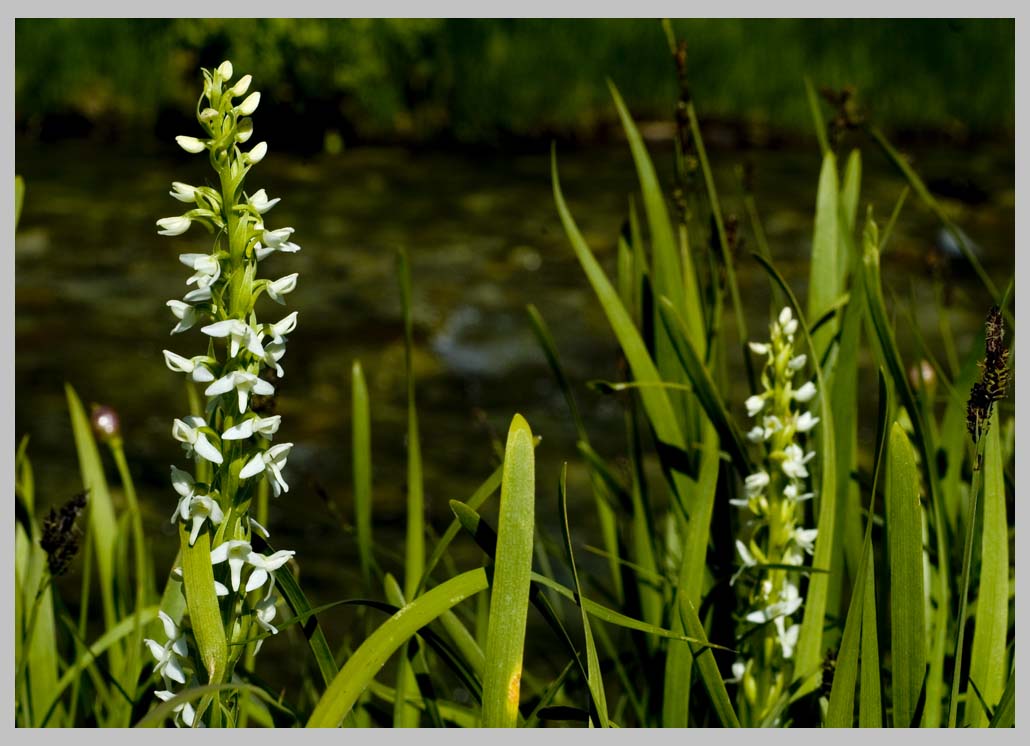

WHITE BOG ORCHID or BOG CANDLE at 1800 m. (Platanthera dilatata) [ click photo for next . . . ]


WHITE BOG ORCHID or BOG CANDLE at 1800 m. (Platanthera dilatata) [ click photo for next . . . ]
The genus name, Orchid, comes to us from the Greek, and means "testicle," referring to the shape of the underground tubercles of some terrestrial species. The designation, Orchid, was first introduced into the Western botanical literature by Aristotle's student and friend, Theophrastus. (De Historia Plantarum / On the Natural History of Plants)The two most striking features of the White Bog Orchid are is stout, erect stem, standing upright to about 25-30 cm., and its reappearance every year / every summer in the fens and seepages of its high mountain habitat.
The beautifully white flowers have a pleasant, fragrant smell. And, according to E.V. Steedman in his "The Ethnobotany of the Thompson Indians of British Columbia" (1928), a heated decoction of White Bog Orchid was used as a wash for rheumatism or other joint pains.
On the road in the Northwest of America.
WITHOUT
A world without light or
sound is thinkable,
but not a world
without
movement.
FIREWEED POEMS—Four Romances &
Mystery Flower
(1)
Tuning:—it
was as if a light
were carried slowly,
in a measured way,
from player to player
to player,
a light passed on from the very first,
the original, of all earth-bound fires.
Bright star burning,
not without passion,
not without ash.
(2)
It was the beauty
of the writing,—the
proportioning on the page,
that intrigued the scholars most.
They had only fragments, but
they had to be poems, dozens
of them, that much they knew,
they had to be.
They would count the letters, and
what appeared to be the breaks between
the words on a page. Patterns emerged.
And theories concerning meaning
were proposed and circulated.
And yet, it was the rhythm—the sound
of the words—we mustn’t forget:
they had to be poems, that much
they knew—that remained a mystery.
As time passed on, the character of this
absent sound, of its spirit it could be said,
became a source not of clarity but rather
of great confusion to them, finding no
proper place in their lexicon of ancient
knowledge, in their hypothesised ars poetica.
And so at once they did, and yet did not,
notice that something was missing in their
rooms filled with learned yet
strangely mute—one could
almost say—disembodied,
conjectures.
(3)
On the podium, a man
professed that a pipe of crude
concrete made the same sound
as a flute made of gold; that, indeed,
“Sirs—a vibrating column of air
is a vibrating column of air.”
Listening, the young woman felt
such a rage well up within her that
she wanted to run up and gouge
out his eyes.
But then she thought,
“No— “
She would have her chance
to demonstrate the truth
of her sound,
although she knew that few
among them would care to listen.
(4)
No one had taught her
how to tune the strings.
She simply knew. Without
knowing why, she sensed that,
beneath each sounding string
there lay a band of silent
sound as big as the world itself.
She would turn the pegs
until the precise moment a
string touched this source
and was illumined by it.
And this she thought was love, as
big as the world itself, and yet,
so intimate and small she could
hold it in her hands.
And still she knew that, if
she were to hold it too tightly,
as hers and hers alone—
that this sound, no matter
how hard she might try, would lose
all its beauty, and that she would have
to stop and learn to tune again.
MYSTERY FLOWER
It was simply there,
waiting almost,
in an abandoned field.
There were roads nearby.
And a noise that made them
uneasy about lingering too long.
They had all come to study it. And
debate its form, origin,
next of kin.
There was the problem of a name.
And proper epithets. And, of course,
there was the issue of a specimen.
Should they risk transplanting it?
Or would a leaf be enough? No, they
all knew, although not one of them
dared say it out loud:—They must have
a flower. Yes: a single, whole, flower.
That is how they found them. All standing
stones frozen in a circle about a mysterious,
empty center. Outstretched hands gesturing
to the heavens,
—eyes closed,
mouths,
still fully opened.
| download FOUR ROMANCES mp3 [2.8 Mb] |FIREWEED POEMS please preview
[opens in new window]
If you're a picture-poems fan, please visit my Living Water
Gallery—the best of my flowform photography w/ a selection
of quality prints & frames . . .
[ mouse over for controls / lower right fro full-screen ]

All Photographs & texts by Cliff Crego © 2013 picture-poems.com
(created: IV.17.2013)